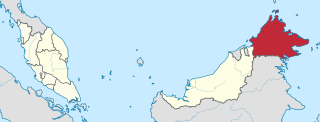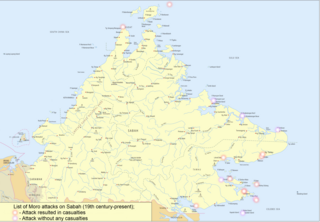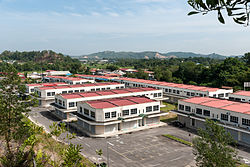
Sabah is a state of Malaysia located in northern Borneo, in the region of East Malaysia. Sabah has land borders with the Malaysian state of Sarawak to the southwest and Indonesia's North Kalimantan province to the south. The Federal Territory of Labuan is an island just off Sabah's west coast. Sabah shares maritime borders with Vietnam to the west and the Philippines to the north and east. Kota Kinabalu is the state capital and the economic centre of the state, and the seat of the Sabah State government. Other major towns in Sabah include Sandakan and Tawau. The 2020 census recorded a population of 3,418,785 in the state. It has an equatorial climate with tropical rainforests, abundant with animal and plant species. The state has long mountain ranges on the west side which forms part of the Crocker Range National Park. Kinabatangan River, the second longest river in Malaysia runs through Sabah. The highest point of Sabah, Mount Kinabalu is also the highest point of Malaysia.

Kota Kinabalu, colloquially referred to as KK, is the state capital of Sabah, Malaysia. It is also the capital of the Kota Kinabalu District as well as the West Coast Division of Sabah. The city is located on the northwest coast of Borneo facing the South China Sea. The Tunku Abdul Rahman National Park lies to its west and Mount Kinabalu, which gave the city its name, is located to its east. Kota Kinabalu has a population of 452,058 according to the 2010 census; when the adjacent Penampang and Tuaran districts are included, the metro area has a combined population of 628,725. The 2020 Census revealed an increase in the municipal population to 500,421, while the wider area including the Penampang and Putatan districts had a population of 731,406.

The Lotud people are an indigenous ethnic group residing in Sabah, eastern Malaysia on the island of Borneo. They reside mainly in the Tuaran district and also a portion of this tribe's population also reside in the village of Kampung Sukoli located in the Telipok suburban township of Kota Kinabalu city, all located in the West Coast Division of Sabah. Their population was estimated at 5,000 in the year 1985 but now believed to be more than 20,000. They are a sub-ethnic group of the Dusunic group, now also known as Kadazan-Dusun.

Inanam is a suburb and sub-district of Kota Kinabalu in Sabah, Malaysia. It is 10 kilometres from the city centre.

Sabah State Railway is a railway system and operator in the state of Sabah in Malaysia. It is the only rail transport system operating on the island of Borneo. The railway consists of a single 134-kilometre line from Tanjung Aru, Kota Kinabalu in West Coast Division to the town of Tenom, in the Interior Division. It was formerly known as North Borneo Railway.

Menggatal or Manggatal is a Malaysian town and suburb of Kota Kinabalu District on the west coast of Sabah. It is an suburb of the state capital, Kota Kinabalu, and is under the jurisdiction of Kota Kinabalu City Hall. It is located along Jalan Tuaran Lama, which is the main road leading north from Kota Kinabalu city centre all the way to neighbouring Tuaran District.

Gaya Island is a sizeable Malaysian island of 1,465 ha, just 10 minutes off Kota Kinabalu, Sabah and forms part of the Tunku Abdul Rahman National Park. Gaya Island derived its name from the word "Gayo" which means big in both the Kadazandusun and Bajau languages and occupies an area of 15 km2 with an elevation of up to 300 metres. Several ridges rise more than 600 feet, peaking at 1,000 feet, along the backbone of Gaya Island.

The Kota Kinabalu City Hall is the city council which administers the city and district of Kota Kinabalu in the state of Sabah, Malaysia. The council consists of the mayor plus twenty-four councillors appointed to serve a one-year term by the Sabah State Government.

Lok Kawi is a township in the West Coast Division of Sabah, Malaysia. Located around the border of the districts of Penampang and Papar, and about 15 kilometres south of the state capital Kota Kinabalu, it has become part of the urban expanse of Kota Kinabalu. Nearby towns include Putatan in the north, and Kinarut in the south.
Hiew King Cheu was a Malaysian politician. He was a member and deputy president of Parti Gagasan Rakyat Sabah (PGRS) from 2019.

Greater Kota Kinabalu refers to the dense clusters of regional populated areas surrounding the city of Kota Kinabalu in Malaysia. It comprises the districts of Kota Kinabalu, Penampang, Tuaran and Papar. These districts are also part of the West Coast Division. It was forecasted that in 2019, the combined population of these districts was 1.1 million people, in a combined area of 3,277 km2.

The Atkinson Clock Tower is the oldest standing structure in Kota Kinabalu. It was originally known as the Atkinson Memorial Clock Tower and sits in solitary on the bluff along Signal Hill Road overlooking this seaside city and capital of Sabah, Malaysia.

The cross border attacks in Sabah are a series of cross border terrorist attacks perpetrated by Moro pirates from Mindanao, Philippines, in the state of Sabah, Malaysia, that began even before the British colonial period. Many civilians have died or suffered during these incidents, causing an increase in anti-Filipino sentiment among the native peoples of Sabah, especially after major attacks in 1985, 2000 and 2013. The attacks were more intense during the presidential terms of Diosdado Macapagal and Ferdinand Marcos, who supported irredentist claims to include eastern Sabah as part of the Philippines territory. In addition, recent infiltration and attacks by militants as well as uncontrolled human migration from Mindanao to Sabah has led to more unease sentiments among the local residents of Sabah, with around 78% of prison inmates that were caught in the state due to involvement in criminal activities and lawlessness issues mainly originating from the southern Philippines.
The Kota Kinabalu Line is a proposed light rapid transit (LRT) system network in Kota Kinabalu, Malaysia, as one of the method to ease traffic congestion in the city. The proposal has been considered, and as reported in the government website, the project was in the ground breaking process under the Kota Kinabalu development plan. The current under construction project of the Aeropod rail station in Tanjung Aru also has made a provision for LRT in their plan.

The Gaya Street is a street Sunday market area in Kota Kinabalu, Sabah, Malaysia. It is known as the Chinatown of Sabah due to many Chinese coffee shops and restaurants situated there. In addition with an arch gate that was erected since 2005.
Tun Mohd Hamdan bin Abdullah was the fourth Governor of the Malaysian state of Sabah.

Filipino refugees are persons originating from the country of the Philippines. Following the Moro conflict and subsequent major military operation in the islands of Mindanao during the administration of President Ferdinand Marcos in 1970s, thousands of Filipinos mainly from the Moro ancestry have sought refuge in neighbouring countries of Malaysia, Indonesia and Brunei, with majority of them mostly heading to the state of Sabah in Malaysia.
The Western Sabah Railway Line in Sabah, Malaysia is the name given to rail services that operate from Tanjung Aru until Tenom in the West Coast and Interior divisions under the management of Sabah State Railway. The line previously known as North Borneo Railway Line.

The Penampang District is an administrative district in the Malaysian state of Sabah, part of the West Coast Division which includes the districts of Kota Belud, Kota Kinabalu, Papar, Penampang, Putatan, Ranau and Tuaran. The capital of the district is in Penampang Town.
















